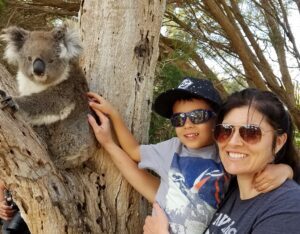
Life is either a daring adventure or nothing at all. – Hellen Keller
10 Best Countries to Work and Live with Family Abroad
Working and living abroad can be an enriching experience. It offers new opportunities for personal and professional growth. The stakes are even higher when you’re relocating with your family. Safety, education, healthcare, and overall quality of life become paramount. You’ll want to find a place where your family feels at home, welcoming you with open arms and making you feel safe and happy.
After all, you’re not just choosing a new home for yourself. But a place where your children can thrive and your family can flourish together.
Here are ten countries that provide great options for working and living with your family.
1. Canada
Canada is a perennial favorite for those seeking a quality life, and it’s easy to see why. With top-notch healthcare, schools, and safe streets, it’s no wonder that cities like Toronto, Vancouver, and Calgary are bustling with expat families. The country’s thriving economy and job market are icing on the cake for those looking to build a career and a future.
From hitting the slopes in the Rockies to soaking up the buzz of urban life, there’s something for everyone. And it’s a place where everyone’s welcome. Canadians pride themselves on their multiculturalism. Plus, they’re all about keeping their country beautiful, so you know the incredible landscapes will be around for generations.
Population – 38 million
GDP – $1.64 trillion
Cost of Living – $2,000 – $3,500 per month
Work Opportunities – A robust job market exists, especially in technology, healthcare, and education.
2. Australia
Australia’s strong economy, high-quality healthcare system, and excellent education make it an attractive destination for families. The country’s diverse job market provides financial stability for families. Cities like Sydney, Melbourne, and Brisbane offer a laid-back lifestyle, beautiful beaches, and a strong sense of community.
The country’s immigration policies also make it relatively easy for skilled workers to relocate with their families. It actively seeks skilled migrants and offers various visa pathways. Australia is one of the countries offering dual citizenship, allowing families to maintain ties to their home country while enjoying the benefits of living.
Population – 26 million
GDP – $1.61 trillion
Cost of Living – $2,500 – $4,000 per month
Work Opportunities – The economy thrives with engineering, manufacturing, and technology opportunities.
3. Germany
Germany’s got it going – a booming economy, fantastic healthcare, and schools that are the envy of the world. If you’re a skilled professional, you’ll find plenty of exciting job opportunities in their thriving industries, setting you up for a comfortable life. And let’s remember the cities! Berlin, Munich, Hamburg.
Each has its unique vibe, plenty of green spaces to unwind in, and a cultural scene that’s always buzzing. These cities aren’t just a pretty face, either. They’re bursting with culture, from museums and art galleries to historic sites and lively festivals. And with reliable public transportation and policies that cater to families.
Population – 84 million
GDP – $4.85 trillion
Cost of Living – $2,000 – $3,500 per month
Work Opportunities – Strong job market in healthcare, mining, and tourism.
4. Sweden
Sweden is the place to be if you’re after that sweet combo of a good life, forward-thinking policies, and stunning scenery. And if you’re thinking of cities, Stockholm and Gothenburg are fantastic choices, boasting great schools, hospitals, and childcare options. It’s no wonder so many families feel right at home here.
It’s known for their love of work-life balance, and it shows. They’ve nailed the art of balancing work and family, from flexible schedules to generous parental leave. It makes it a dream destination for parents who want to be present for their kids while pursuing fulfilling careers. Plus, affordable childcare is readily available.
Population – 10.5 million
GDP – $627 billion
Cost of Living – $2,500 – $4,000 per month
Work Opportunities – Strong economy with engineering, IT, and healthcare opportunities.
5. Switzerland
Switzerland is renowned for its high standard of living, excellent healthcare system, and stunning natural beauty. The country boasts a stable economy with numerous job opportunities in various sectors, ensuring financial security for families. Cities like Zurich, Geneva, and Bern offer families a safe and welcoming environment.
The strong economy and low crime rate make it an attractive destination for expats looking to work and live with their families. Switzerland’s competitive salaries and attractive benefits packages attract skilled professionals worldwide. The country’s emphasis on safety and security ensures a peaceful and stable family environment.
Population – 8.7 million
GDP – $834 billion
Cost of Living – $3,500 – $5,500 per month
Work Opportunities – Diverse job market focusing on finance, technology, and healthcare.
6. New Zealand
New Zealand is known for its pristine natural landscapes, friendly locals, and excellent work-life balance. The country’s commitment to environmental conservation ensures clean air and water, contributing to a healthy lifestyle for families. Cities like Auckland, Wellington, and Christchurch boast excellent living standards, healthcare, and education.
Its relaxed pace of life and outdoor lifestyle make it an excellent choice for families looking to settle abroad. New Zealand offers various outdoor activities, from hiking and biking to water sports and skiing, catering to all interests and age groups. The strong sense of community and emphasis on family values create a welcoming and supportive environment.
Population – 5 million
GDP – $242 billion
Cost of Living – $2,500 – $4,000 per month
Work Opportunities – A growing job market is growing, especially in healthcare, agriculture, and tourism.
7. Singapore
Singapore is a bustling city-state known for its modern infrastructure, excellent healthcare, and education systems. The city-state’s cleanliness, safety, and efficiency make it an appealing place for families seeking a high quality of life. Despite the high living costs, its safety, public transport, and multicultural vibe draw expats.
They offer various housing options, from modern apartments to landed properties, catering to different budgets and preferences. The strong economy and business-friendly environment make it an attractive destination for expats. They are making it an attractive destination for expat entrepreneurs and investors.
Population – 5.9 million
GDP – $391 billion
Cost of Living – $3,000 – $5,500 per month
Work Opportunities – Diverse job market focusing on finance, technology, and healthcare.
8. Denmark
Denmark consistently ranks high in quality of life indexes. The country boasts a robust social welfare system that provides comprehensive support to families, ensuring access to quality healthcare, education, and social services. Copenhagen offers a high standard of living with green spaces, culture, and family-friendly amenities.
The city’s canals, colorful houses, and historic architecture create a picturesque and inviting atmosphere. Its emphasis on work-life balance and family-friendly policies make it an ideal choice for expat families. Denmark promotes a healthy work-life balance with shorter working hours, generous paid leave, and flexible working arrangements.
Population – 5.9 million
GDP – $398 billion
Cost of Living – $2,500 – $4,000 per month
Work Opportunities – Strong job market in engineering, IT, and renewable energy sectors.
9. Norway
Norway is known for its stunning natural landscapes, high standard of living, and robust social welfare system. The country’s commitment to environmental conservation and sustainable living creates a clean and healthy family environment. Cities like Oslo, Bergen, and Trondheim offer excellent healthcare, education, and childcare facilities.
These cities also boast a rich cultural heritage with museums, art galleries, theatres, and historical landmarks, providing ample opportunities for cultural enrichment. Its emphasis on outdoor activities, such as hiking, skiing, and fishing, makes it an excellent choice for families seeking a healthy, active lifestyle.
Population – 5.5 million
GDP – $504 billion
Cost of Living – $2,500 – $4,500 per month
Work Opportunities – The economy thrives, focusing on oil and gas, maritime, and technology.
10. Netherlands
The Netherlands is known for its tolerant and liberal culture, excellent healthcare, and education systems. The country’s emphasis on diversity and inclusivity creates a welcoming environment for families from all backgrounds. Cities like Amsterdam, Rotterdam, and Utrecht offer a high standard of living, with plenty of green spaces.
The efficient public transport system and emphasis on work-life balance make it an ideal choice for expat families. The extensive network of trains, trams, buses, and cycle paths makes it easy for families to get around without needing a car. The Netherlands prioritizes family time, with generous parental leave policies and flexible working arrangements.
Population – 17.5 million
GDP – $1.02 trillion
Cost of Living – $2,500 – $4,000 per month
Work Opportunities – Strong economy with agriculture, logistics, and technology opportunities.
Wrap Things Up!
These ten countries are a goldmine for families seeking a fulfilling life abroad, soaking up the sun on a pristine beach. You are exploring bustling city streets packed with hidden gems or settling into a warm, welcoming community. Each country offers unique flavours catering to various lifestyles and career aspirations. The world is your playground.
With some planning and a sprinkle of adventure, your dream of living and working abroad can quickly become a reality.
What countries do you think are great for families looking to move abroad? We would love to hear from you! Please post your comments below.
Make travel exciting for children with the Travel Rangers picture book series Available Here
To hear more about family travel abroad experiences, travel tips, and more, listen to the Planes, Trains, & Kids Abroad travel podcast today!
Written by: Cody Williams – Cody is a specialist in crafting engaging articles on a diverse range of topics, including technology, artificial intelligence, relocation, remote work, retirement, and digital marketing.



